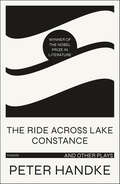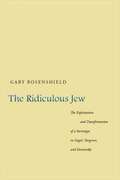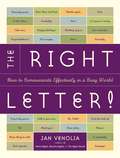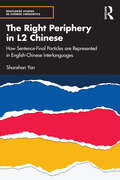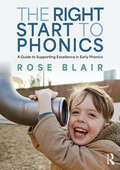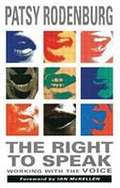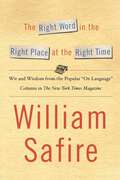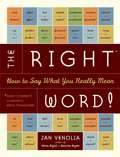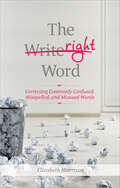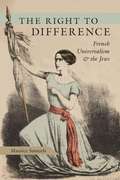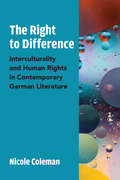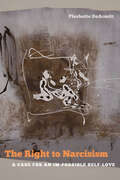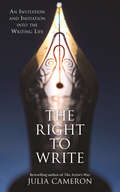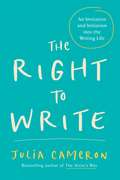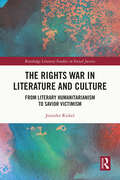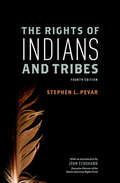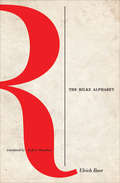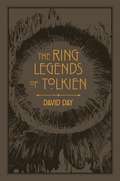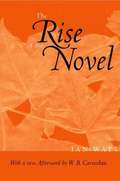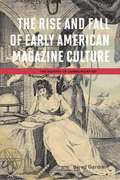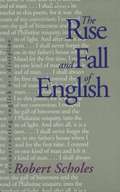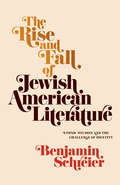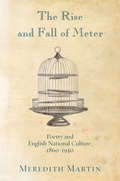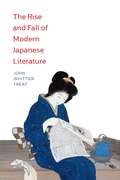- Table View
- List View
The Ride Across Lake Constance: and Other Plays
by Peter HandkeA collection of six plays by Nobel Prize winner Peter Handke, spanning the early years of the Austrian playwright's careerThe first full-length play The Ride Across Lake Constance, is one of Handke's best-known works. It deals directly with one of Handke's favorite themes: the realities of theater itself, independent of the offstage world, and the way language (dialogue) and objects (props) operate in the skewed world of the stage.Therein it anticipates They Are Dying Out, the second full-length play in this volume. In some ways more conventional than many of Handke's plays, They Are Dying Out presents one of his most fascinating protagonists, Quitt, a businessman who first induces a group of colleagues to set up a monopoly and then torpedoes the scheme.The four short plays that round out the book--Prophecy, Calling for Help, Quodlibet, and My Foot My Tutor--were written before The Ride Across Lake Constance and show Handke moving from the experimental mode of his early work toward the richness and complexity that have marked him as the most important dramatist since Becket. Together, Handke's plays bear witness to the truth of Richard Gilman's observation that "in Handke's theater, language, exposed, assaulted, wrestled with, driven to limits, and pursued still further, begins to take on, like the color returning to the cheeks of a nearly hanged man, the signs of a strange and unexpected resurrection."
The Ridiculous Jew
by Gary RosenshieldThis book is a study devoted to exploring the use of a Russian version of the Jewish stereotype (the ridiculous Jew) in the works of three of the greatest writers of the nineteenth century. Rosenshield does not attempt to expose the stereotype-which was self-consciously and unashamedly employed. Rather, he examines how stereotypes are used to further the very different artistic, cultural, and ideological agendas of each writer. What distinguishes this book from others is that it explores the problems that arise when an ethnic stereotype is so fully incorporated into a work of art that it takes on a life of its own, often undermining the intentions of its author as well as many of the defining elements of the stereotype itself. With each these writers, the Jewish stereotype precipitates a literary transformation, taking their work into an uncomfortable space for the author and a challenging one for readers.
The Right Letter: How to Communicate Effectively in a Busy World (Right! Series)
by Jan VenoliaReplaces previous edition.In today'¬?s hectic world of cell phones, email, and instant messages, is it still worthwhile to know how to write a good letter? Absolutely! An attractive, well-written letter can grab the reader'¬?s attention and hold it long after someone else'¬?s email has been discarded. It can make a strong, lasting impression on a hiring manager, potential client, or faraway friend who receives it. In other words, the letter is still an important professional and personal communication tool, one that too few people know about these days. In this completely revised and updated edition of BETTER LETTERS, writing authority Jan Venolia dispenses expert advice on creating the perfect letter, covering composition, style, and format. With THE RIGHT LETTER! your message will rise above the rest. This handy, portable addition to the Right! series (650,000 copies sold) is an important guide to effective letter writing, including a section on email. With so many people complaining about the glut of email, spam, and misinformation, this reference is needed now more than ever. Previous editions of BETTER LETTERS have sold more than 80,000 copies.From the Trade Paperback edition.
The Right Periphery in L2 Chinese: How Sentence-Final Particles are Represented in English-Chinese Interlanguages (Routledge Studies in Chinese Linguistics)
by Shanshan YanThe Right Periphery in L2 Chinese is among the first books to try to incorporate both advanced linguistic and acquisition perspectives to show how eight sentence-final particles are represented in English-speaking learners’ L2 Chinese. This book will inform researchers of the general construction of the right periphery in L2 grammars. Drawing on up-to-date theoretical frameworks and findings from advanced empirical studies, it sketches the general picture of the periphery that these particles occupy in English-Chinese interlanguages. Readers will grasp the problems and difficulties, and particularly the ambiguities, which learners of Chinese must grapple with in the process of acquiring sentence-final particles. Possible influential factors underlying the acquisition process are explicitly discussed as well. Researchers will also find insights in the advanced methodologies and statistics that are used to study Chinese. The book will be illuminating for researchers interested in SLA, linguists of generative theories, and educators teaching Chinese as a second/foreign language.
The Right Start to Phonics: A Guide to Supporting Excellence in Early Phonics
by Rose BlairIf children are to access all phonics teaching effectively, they first need to know how to tune into and manipulate the sounds specifically needed for reading. The Right Start to Phonics shows readers how they can support children in gaining the skills they need to listen with accuracy, to differentiate between, manipulate and understand the sounds we hear. This experience will give them the knowledge and understanding needed to hear letter sounds and blend them together to eventually read words.Drawing on the latest research, the book shows how Early Phonics can be embedded across your provision and fit into the daily routine of any setting or school. Part One explores the role of play, the adult and the learning environment in supporting early phonics and listening skills. This is followed by a wealth of easy-to-use activities to support the development and refinement of these hugely important skills in our youngest children. All the activities are simple to implement with easily sourced resources and cover a range of early phonic skills.Full of playful, active and fun ideas to help young children develop the auditory skills they need to access the phonic code, this is essential reading for all early years and primary educators and parents.
The Right To Speak: Working With The Voice
by Patsy Rodenburg Ian McKellenIn The Right to Speak, renowned voice teacher Patsy Rodenburg teaches you how to meet any speaking challenge with total self-assurance. <P><P>Rodenburg has trained thousands of actors, singers, media personalities, lawyers, politicians, business people, teachers and students in the art of using their voice fully and expressively without fear. <P><P>She has taught them how to breathe, how to support their breath, how to stretch their voice to meet any vocal effort and how to have total confidence in whatever they say--"the right to speak."
The Right Word in the Right Place at the Right Time: Wit and Wisdom from the Popular "On Language" Column in The New York Times Magazine
by William SafireFor the past twenty-five years Americans have relied on Pulitzer Prize-winning wordsmith William Safire for their weekly dose of linguistic illumination in The New York Times Magazine's column "On Language" -- one of the most popular features of the magazine and a Sunday-morning staple for innumerable fans. He is the most widely read writer on the English language today. Safire is the guru of contemporary vocabulary, speech, language, usage and writing. Dedicated and disputatious readers itch to pick up each column and respond to the week's linguistic wisdom with a gotcha letter to the Times. The Right Word in the Right Place at the Right Time marks the publication of Safire's sixteenth book on language. This collection is a classic to be read, re-read, enjoyed and fought over. Fans, critics and fellow linguists wait with bated (from the French abattre "to beat down") breath for each new anthology -- and, like its predecessors, this one is bound to satisfy and delight. Safire finds fodder for his columns in politics and current events, as well as in science, technology, entertainment and daily life. The self-proclaimed card-carrying language maven and pop grammarian is not above tackling his own linguistic blunders as he detects language trends and tracks words, phrases and clichés to their source. Scholarly, entertaining and thoughtful, Safire's critical observations about language and slanguage are at once provocative and enlightening. Safire is America's go-to guy when it comes to language, and he has included sharp and passionately opinionated letters from readers across the English-speaking world who have been unable to resist picking up a pen to put the maven himself in his place or to offer alternate interpretations, additional examples, amusing anecdotes or just props. The Right Word in the Right Place at the Right Time is a fascinating, learned and piquant look at the oddities and foibles that find their way into the English language. Exposing linguistic hooey and rigamarole and filled with Safire's trademark wisdom, this book has a place on the desk or bedside table of all who share his profound love of the English language -- as well as his penchant for asking "What does that mean?" Or, "Wassat?" This new collection is sure to delight readers, writers and word lovers everywhere and spark the interest of anyone who has ever wondered, "Where did the phrase 'brazen hussy' come from?"
The Right Word!: How to Say What You Really Mean (Right! Series)
by Jan VenoliaEvery writer needs help with words: choosing them, using them, spelling them correctly. When is optimal or optimum the better choice? Why use germane when relevant is, well, more relevant? Created for just such tortuous (torturous?) situations, this handy guide provides an A-to-Z listing of troublesome, confusing words, accompanied by clear examples and explanations to help avoid common mistakes. With a discussion on getting the most out of words, a helpful resource section, humorous illustrations, and clever bits of wordplay, this compact reference is an indispensable resource.The latest addition to Jan Venolia'¬?s Right! series, which has sold more than 600,000 copies.With the growing influence of email and other instant communication on the English language, a modern reference is more important than ever.Small and portable, this book is easier to carry and to use than some of the larger, bulkier reference works.The cover design for WRITE RIGHT! and REWRITE RIGHT! was selected to display in the AIGA (American Institute of Graphic Arts) 50 Books / 50 Covers Exhibition in 2001. The designer for this series (including The Right Word!) is Paul Kepple, director, Headcase Design, Philadelphia, PA.From the Trade Paperback edition.
The Right Word: Correcting Commonly Confused, Misspelled, and Misused Words
by Elizabeth MorrisonAffect or effect?Right, write, or rite?Soul or sole?Two, too, or to?English can certainly be a confusing language, whether you’re a native speaker or learning it as a second language. The Right Word is the essential reference to help anyone master its subtleties and avoid the most common mistakes.Divided into three sections, The Right Word first examines homophones, those tricky words that sound the same but are spelled differently. Entries are organized alphabetically, with meanings and examples (including colloquial ones) given to facilitate correct use. Author Elizabeth Morrison then looks at words that often confuse—childish vs. childlike, incredible vs. incredulous—before providing a list of commonly misspelled words.The Right Word deserves a place on every bookshelf: at home, in the study, and at the office. Written by a teacher and journalist with years of experience in effective writing and communication, The Right Word is an essential reference for:Students of English, especially those for whom English is a second language.Businesspeople wanting to improve written communication..Crossword addicts..Anyone with an interest in words and language.
The Right to Difference: French Universalism and the Jews
by Maurice SamuelsUniversal equality is a treasured political concept in France, but recent anxiety over the country's Muslim minority has led to an emphasis on a new form of universalism, one promoting loyalty to the nation at the expense of all ethnic and religious affiliations. This timely book offers a fresh perspective on the debate by showing that French equality has not always demanded an erasure of differences. Through close and contextualized readings of the way that major novelists, philosophers, filmmakers, and political figures have struggled with the question of integrating Jews into French society, Maurice Samuels draws lessons about how the French have often understood the universal in relation to the particular. Samuels demonstrates that Jewish difference has always been essential to the elaboration of French universalism, whether as its foil or as proof of its reach. He traces the development of this discourse through key moments in French history, from debates over granting Jews civil rights during the Revolution, through the Dreyfus Affair and Vichy, and up to the rise of a "new antisemitism" in recent years. By recovering the forgotten history of a more open, pluralistic form of French universalism, Samuels points toward new ways of moving beyond current ethnic and religious dilemmas and argues for a more inclusive view of what constitutes political discourse in France.
The Right to Difference: Interculturality and Human Rights in Contemporary German Literature
by Nicole ColemanThe Right to Difference examines novels that depict human rights violations in order to explore causes of intergroup violence within diverse societies, using Germany as a test case. In these texts, the book shows that an exaggeration of difference between minority and majority groups leads to violence. Germany has become increasingly diverse over the past decades due to skilled labor migration and refugee movements. In light of this diversity, this book’s approach transcends a divide between migrant and post-migrant German literature on the one hand and a national literature on the other hand. Addressing competing definitions of national identity as well as the contest between cultural homogeneity and diversity, the author redefines the term “intercultural literature.” It becomes not a synonym for authors who do not belong to a national literature, such as migrant writers, but a way of reading literature with an intercultural lens. This book builds a theory of intercultural literature that focuses on the multifaceted nature of identity, in which ethnicity represents only one of many characteristics defining individuals. To develop intercultural competence, one needs to adopt a complex image of individuals that allows for commonalities and differences by complicating the notion of sharp contrasts between groups. Revealing the affective allegiances formed around other characteristics (gender, profession, personal motivations, relationships, and more) allows for similarities that grouping into large, homogeneous, and seemingly exclusive entities conceals. Eight novels analyzed in this book remember and reveal human rights violations, such as genocide, internment and torture, violent expulsion, the reasons for fleeing a country, dangerous flight routes and the difficulty of settling in a new country. Some of these novels allow for affective identification with diverse characters and cast the protagonists as individuals with plural perspectives and identities rather than monolithic members of one large national or ethnic group, whereas others emphasize the commonalities of all people. Ultimately, the author makes the case for German Studies to contribute to an antiracist approach to diversity by redefining what it means to be German and establishing difference as a fundamental human right
The Right to Narcissism: A Case for an Im-possible Self-love
by Pleshette DeArmittThis book aims to wrest the concept of narcissism from its common and pejorative meanings— egoism and vanity—by revealing its complexity and importance. DeArmitt undertakes the work of rehabilitating “narcissism” by patiently reexamining the terms and figures that have been associated with it, especially in the writings of Rousseau, Kristeva, and Derrida.These thinkers are known for incisively exposing a certain (traditional) narcissism that has been operative in Western thought and culture and for revealing the violence it has wrought— from the dangers of amour-propre and the pathology of a collective “one’s own” to the phantasm of the sovereign One. Nonetheless, each of these thinkers denounces the naive denunciation of “narcissism,” as the dangers of a non-negotiation with narcissism are more perilous. By rethinking “narcissism” as a complex structure of self-relation through the Other, the book reveals the necessity of an im-possible self-love.
The Right to Write: An Invitation and Initiation into the Writing Life (Artist's Way Ser.)
by Julia Cameron'We should write because it is human nature to write' Julia CameronIn The Right to Write, Julia Cameron's most revolutionary book, the author asserts that conventional writing wisdom would have you believe in a false doctrine that stifles creativity.This isn't a book of rules and certainly not about how to write that query letter, how to find a market for your work, or how to find an agent. It's about using writing to bring clarity and passion to the act of living. The secrets in breaking loose from the grip of your established thought process, to unleash the wave of creativity striving to express itself within.Here are techniques and illustrative stories to help you make writing a natural, intensely personal part of life. And this book includes the details of Cameron's own writing processes when creating her best selling books, which include the phenomenal and world famous The Artist's Way and Vein of Gold.For those jumping into the writing life for the first time and for those already living it, the art of writing will never be the same after reading this book. Provocative, thoughtful and exciting, you'll return to it again and again as you seek to liberate and cultivate the writer residing within you.
The Right to Write: An Invitation and Initiation into the Writing Life (Artist's Way)
by Julia CameronWhat if everything we have been taught about learning to write was wrong? In The Right to Write, Julia Cameron's most revolutionary book, the author of the bestselling self-help guide The Artist's Way, asserts that conventional writing wisdom would have you believe in a false doctrine that stifles creativity. With the techniques and anecdotes in The Right to Write, readers learn to make writing a natural, intensely personal part of life. Cameron's instruction and examples include the details of the writing processes she uses to create her own bestselling books. She makes writing a playful and realistic as well as a reflective event. Anyone jumping into the writing life for the first time and those already living it will discover the art of writing is never the same after reading The Right to Write.
The Rights War in Literature and Culture: From Literary Humanitarianism to Savior Victimism (Routledge Literary Studies in Social Justice)
by Jennifer RickelRights War tracks how the human rights framework is weaponized against the oppressed, and it makes the case for the central place of literature in understanding this seizure of narrative control. While literary humanitarianism depoliticizes suffering and positions the reader as a savior to traumatized Others, Rights War shows how contemporary fiction by women of color and queer writers across the African diaspora engage innovative narrative paradigms to address structural inequities. It analyzes strategies set out in this literature for disarming savior victimism, which it identifies as a pernicious cultural phenomenon in which the powerful proclaim themselves saviors to and victims of those they marginalize. As the disassociation of national rights from international human rights and the disconnection of civil and political rights from social and economic rights provoke a contest of victimhood, this book offers a renewed argument for the indivisibility of rights and the social justice function of literature.
The Rights of Indians and Tribes
by Stephen L. PevarThe Rights of Indians and Tribes, first published in 1983, has sold over 100,000 copies and is the most popular resource in the field of Federal Indian Law. The book, which explains this complex subject in a clear and easy-to-understand way, is particularly useful for tribal advocates, government officials, students, practitioners of Indian law, and the general public. Numerous tribal leaders highly recommend this book. Incorporating a user-friendly question-and-answer format, <P> The Rights of Indians and Tribes addresses the most significant legal issues facing Indians and Indian tribes today, including tribal sovereignty, the federal trust responsibility, the regulation of non-Indians on reservations, Indian treaties, the Indian Civil Rights Act, the Indian Gaming Regulatory Act, and the Indian Child Welfare Act. This fully-updated new edition features an introduction by John Echohawk, Executive Director of the Native American Rights Fund.
The Rilke Alphabet
by Ulrich BaerThe renowned Rilke scholar brings the poet&’s work to life for modern readers through 26 essays, each devoted to a single word found in his writings. Ulrich Baer&’s The Rilke Alphabet explores the enduring power of one of the world&’s greatest poets, a visionary who saw that even the smallest overlooked word could unlock life&’s mysteries. With deep insight and love for Rilke&’s language, Baer examines twenty-six words that are not merely unexpected in his work, but problematic—even scandalous. Through twenty-six evocative essays, Baer sheds new light on Rilke&’s creative process and his deepest thoughts about life, art, politics, sexuality, love, and death. The Rilke Alphabet shows how the poet&’s work can be a guide to life even in our contemporary world. Whether it is a love letter to frogs, a troubling—though brief—infatuation with Mussolini, a sustained reflection on the Buddha, or the impassioned assertion that freedom must be lived in order to be known, Rilke&’s thoroughly original writings pull us deeply into life. Baer&’s decades-long experience as a scholar, translator, and editor of Rilke&’s writings allows him to reveal unique aspects of Rilke&’s work. The Rilke Alphabet will surprise and delight Rilke fans, and deepen every reader&’s sense of the power of poetry to penetrate the mysteries of our world.
The Ring Legends of Tolkien: An Illustrated Exploration of Rings in Tolkien's World, and the Sources that Inspired his Work from Myth, Literature and History
by David DayTolkien's One Ring, at the centre of one of the greatest fantasy tales ever told, is an undeniably iconic and powerful symbol in literature. Tracing centuries of ancient folklore, The Ring Legends of Tolkien is a deep and highly informed investigation into the inspiration behind Tolkien's epic fantasy world, exploring the origins of the One Ring, as well as the extraordinary myths and legends that inspired Tolkien's works.This work is unofficial and is not authorized by the Tolkien Estate or HarperCollins Publishers.
The Rip Current Rescue
by Monty Ward Tony SanseveroThe final installment of the Reading Street curriculum series, Reading Street: Grade 6, comes complete with everything you'll need to create English and Language Arts lessons for your child. This system includes reading selections designed to help your child hone his or her skills, a Teacher Resource DVD to make your task of developing lessons easier, and a packet of curriculum materials. Reading Street: Grade 6 is a comprehensive system designed to enhance your child's skills in reading, writing and language. Each assignment in Reading Street helps your child progress toward that goal. While such a dynamic curriculum might sound challenging for you as a parent and educator to use, you can rest assured that the materials will guide you through 12 weeks of English and Language Arts lesson planning with ease. If you prefer a structured homeschooling program format, Reading Street (in all of its Grade level structures) is the right fit for you and your child. Grade 6 comes with two volumes of six units. By the time you complete Grade 6, your child will be able to: Read through a variety of complex literature, including biographies and fictional stories. Discover additional reading material based on personal taste. Relate individual chapters or concepts to the book as a whole. Write complete stories using proper grammar, punctuation and word choice. Compose a written argument using appropriate sources. Examine and edit his or her own writing, as well as the writing of others. Present an oral presentation based on the lessons. Unlike other curricula, Reading Street imparts a love of reading upon your child. From Grade 1 through Grade 6, your child will learn not only the skills he or she needs to advance his or her education, but become a lifelong student and reader. For more information about the specific materials included in the Reading Street: Grade 6 curriculum for homeschooling, visit the Features and Benefits page.
The Rise Of The Novel
by Ian P. Watt W. B. Carnochan"Ian Watt's The Rise of the Novel still seems to me far and away the best book ever written on the early English novel—wise, humane, beautifully organized and expressed, one of the absolutely indispensable critical works in modern literary scholarship. And W. B. Carnochan's brilliant introduction does a wonderful job of showing how Watt's book came into being and changed for good the way the novel in general is taught and understood."—Max Byrd, author of Grant: A Novel "Ian Watt's The Rise of the Novel remains the single indispensable, absolutely essential book for students of the 18th-century novel."—John Richetti, author of The English Novel in History: 1700-1780 Praise for the original edition: "A remarkable book. . . . A pioneer work in the application of modern sociology to literature."—Manchester Guardian "An outstanding contribution to the field of historical sociology and the sociology of knowledge. . . . The author has set the 'rise of the novel' as a new literary genre in the social context of eighteenth-century England, with emphasis on the predominant middle-class features of the period."—American Journal of Sociology
The Rise and Fall of Early American Magazine Culture
by Jared GardnerCountering assumptions about early American print culture and challenging our scholarly fixation on the novel, Jared Gardner reimagines the early American magazine as a rich literary culture that operated as a model for nation-building by celebrating editorship over authorship and serving as a virtual salon in which citizens were invited to share their different perspectives. The Rise and Fall of Early American Magazine Culture reexamines early magazines and their reach to show how magazine culture was multivocal and presented a porous distinction between author and reader, as opposed to novel culture, which imposed a one-sided authorial voice and restricted the agency of the reader.
The Rise and Fall of English: Reconstructing English as a Discipline
by Robert ScholesIn this lucid book, an eminent scholar, teacher, and author takes a critical look at the nature and direction of English studies in America today. Robert Scholes offers a thoughtful and optimistic argument to preserve the best in the English tradition of verbal and textual studies, while arguing for a radical reconstruction of the discipline of English--away from political issues and a specific canon of texts and toward a canon of methods
The Rise and Fall of Jewish American Literature: Ethnic Studies and the Challenge of Identity (Jewish Culture and Contexts)
by Benjamin SchreierBenjamin Schreier argues that Jewish American literature's dominant cliché of "breakthrough"—that is, the irruption into the heart of the American cultural scene during the 1950s of Jewish American writers like Bernard Malamud, Philip Roth, Saul Bellow, and Grace Paley—must also be seen as the critically originary moment of Jewish American literary study. According to Schreier, this is the primal scene of the Jewish American literary field, the point that the field cannot avoid repeating and replaying in instantiating itself as the more or less formalized academic study of Jewish American literature. More than sixty years later, the field's legibility, the very condition of its possibility, remains overwhelmingly grounded in a reliance on this single ethnological narrative.In a polemic against what he sees as the unexamined foundations and stagnant state of the field, Schreier interrogates a series of professionally powerful assumptions about Jewish American literary history—how they came into being and how they hardened into cliché. He offers a critical genealogy of breakthrough and other narratives through which Jewish Studies has asserted its compelling self-evidence, not simply under the banner of the historical realities Jewish Studies claims to represent but more fundamentally for the intellectual and institutional structures through which it produces these representations. He shows how a historicist scholarly narrative quickly consolidated and became hegemonic, in part because of its double articulation of a particular American subject and of a transnational historiography that categorically identified that subject as Jewish. The ethnological grounding of the Jewish American literary field is no longer tenable, Schreier asserts, in an argument with broad implications for the reconceptualization of Jewish and other identity-based ethnic studies.
The Rise and Fall of Meter: Poetry and English National Culture, 1860--1930
by Meredith MartinWhy do we often teach English poetic meter by the Greek terms iamb and trochee? How is our understanding of English meter influenced by the history of England's sense of itself in the nineteenth century? Not an old-fashioned approach to poetry, but a dynamic, contested, and inherently nontraditional field, "English meter" concerned issues of personal and national identity, class, education, patriotism, militarism, and the development of English literature as a discipline. The Rise and Fall of Meter tells the unknown story of English meter from the late eighteenth century until just after World War I. Uncovering a vast and unexplored archive in the history of poetics, Meredith Martin shows that the history of prosody is tied to the ways Victorian England argued about its national identity. Gerard Manley Hopkins, Coventry Patmore, and Robert Bridges used meter to negotiate their relationship to England and the English language; George Saintsbury, Matthew Arnold, and Henry Newbolt worried about the rise of one metrical model among multiple competitors. The pressure to conform to a stable model, however, produced reactionary misunderstandings of English meter and the culture it stood for. This unstable relationship to poetic form influenced the prose and poems of Robert Graves, Siegfried Sassoon, Wilfred Owen, W. B. Yeats, Ezra Pound, and Alice Meynell. A significant intervention in literary history, this book argues that our contemporary understanding of the rise of modernist poetic form was crucially bound to narratives of English national culture.
The Rise and Fall of Modern Japanese Literature
by John Whittier TreatThe Rise and Fall of Modern Japanese Literature tells the story of Japanese literature from its start in the 1870s against the backdrop of a rapidly coalescing modern nation to the present. John Whittier Treat takes up both canonical and forgotten works, the non-literary as well as the literary, and pays special attention to the Japanese state’s hand in shaping literature throughout the country’s nineteenth-century industrialization, a half-century of empire and war, its post-1945 reconstruction, and the challenges of the twenty-first century to modern nationhood. Beginning with journalistic accounts of female criminals in the aftermath of the Meiji civil war, Treat moves on to explore how woman novelist Higuchi Ichiyo’s stories engaged with modern liberal economics, sex work, and marriage; credits Natsume Soseki’s satire I Am a Cat with the triumph of print over orality in the early twentieth century; and links narcissism in the visual arts with that of the Japanese I-novel on the eve of the country’s turn to militarism in the 1930s. From imperialism to Americanization and the new media of television and manga, from boogie-woogie music to Yoshimoto Banana and Murakami Haruki, Treat traces the stories Japanese audiences expected literature to tell and those they did not. The book concludes with a classic of Japanese science fiction a description of present-day crises writers face in a Japan hobbled by a changing economy and unprecedented natural and manmade catastrophes. The Rise and Fall of Japanese Literature reinterprets the “end of literature”—a phrase heard often in Japan—as a clarion call to understand how literary culture worldwide now teeters on a historic precipice, one at which Japan’s writers may have arrived just a moment before the rest of us.
